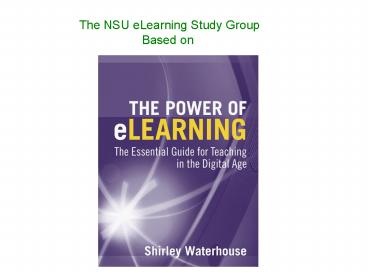The NSU eLearning Study Group - PowerPoint PPT Presentation
1 / 16
Title:
The NSU eLearning Study Group
Description:
Part I Pedagogy & Planning. Chapters 1,2,3. Part II Tools & Resources. Chapters 4,5,6,7,8 ... eLearning Pedagogy. 3 Noted Pedagogical Works Related to eLearning ... – PowerPoint PPT presentation
Number of Views:24
Avg rating:3.0/5.0
Title: The NSU eLearning Study Group
1
The NSU eLearning Study Group Based on
2
The Scope
- The purpose of this study group is to read and
study the book, The Power of eLearning. - This is voluntary for everyone involved.
- While, there may be other opportunities to
discuss problems, develop programs, etc.they
are outside the scope of this study group. - There are no expectations of the outcome of this
exercise except to study together and enhance our
self-knowledge of this important topic.
3
The Format1200 100
- 1200 1230
- Lunch and Presentation of the chapter(s).
- 1230 1255
- Break into teams of 4-5 people and discuss the
material being studied.
4
The Parts
- Part I Pedagogy Planning
- Chapters 1,2,3
- Part II Tools Resources
- Chapters 4,5,6,7,8
- Part III Course Management
- Chapters 9,10,11
5
- Chapter OneeLearning Fundamentals
6
Basic eLearning Concepts
- Pedagogy
- Andragogy
- eLearning pedagogy
7
Terms Relevant to eLearning Pedagogy
- elearning course (course)
- elearning resource (resource)
- access
- elearning activity (activity)
- elearning strategy
- Instructional technology/Educational technology
8
Learning Management Systems and Coursesites
- Rising popularity of LMS Software
- LMS Functionality
- Example Uses of LMS Functionality
9
elearnings Potential to Improve Teaching and
Learning
- Facilitates student-centered learning
- Facilitates Anytime-Anyplace Learning
- Facilitates Student Interaction with Course
Content - Facilitates and Promotes Communication
Collaboration - Makes Course Administration Easier
- Helps Track Students Time on Task
- Can Reduce the Cost of Delivering Instruction
- Adds a Worldwide Dimension to Courses
10
Online Learning Exemplars
11
Major eLearning Challenges
- Technology Challenges
- Instructor Challenges
- Effectiveness Challenges
12
6 Steps for Getting Started
- Ask yourself Why?
- Make a Commitment
- Develop a New vision for your Course and How you
Teach - Determine the Resources Available to You.
- Acquire New Technology Skills Develop New
instructional Methods - Plan
13
- Chapter 2eLearning Pedagogy
14
3 Noted Pedagogical Works Related to eLearning
- 7 Principles for Good Practice in Undergraduate
Education - Blooms Taxonomy of Intellectual Behaviors
- Gagnes 9 Events of Instruction
15
Student-Centered Instruction and elearning
- The Lecture delivery format is revised.
- The instructor becomes a facilitator
- Learning styles are addressed
- Students are provided choices
- Web-based interaction with content is implemented
- Student communication and collaboration are
increased - Problem-based learning is implemented
- Self-assessment is used as a learning activity
- Portfolio assessment is implemented.
16
Terms to Describe eLearning Delivery Modes
- Distance Learning
- Online Learning
- Hybrid eLearning Delivery Mode
- Synchronous vs. Asynchronous Learning and
Communications

